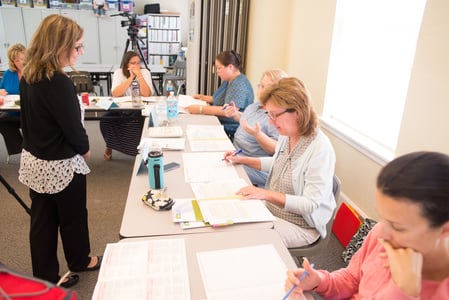
A while back I came across an Edutopia article, The Teacher Curse No One Wants to Talk About, by Christopher Reddy. The first line in the article reads “Knowledge is a curse.” I thought, "What?! No way!" Of course, I had to read on.
The article went on to share that all of our acquired knowledge makes it difficult to remember a time when we didn’t know what we know now. (My colleague, Cierra Johnson, also touches on this when she compares learning CLASS to learning how to drive.) As a result of all this knowledge, it can “... make us blind to the lengthy process of acquiring it.” If you have been delivering CLASS training for quite awhile now, or even actively implementing CLASS, it can be easy to forget the time spent learning the complexity of the tool.
How can the curse manifest itself in our trainings? If I personally reflect, one detriment is that I was probably making Day 1 of a CLASS Observation training more challenging to facilitate, and possibly overwhelming the participants. Why is that?
Day 1 is full of content. We take the tool apart dimension-by-dimension, with the goal of putting it all back together again at the end of the day. You know, that moment when we finally arrive at Training Video 1. When I was a rookie trainer, I moved much more quickly through dimensions than I do now. Now, if I’m not careful, I won’t even make it to training video 1, our goal for ending the first day of Observation training. What is happening? Well, I know way more about CLASS now than I did in my early training days. I’m filling the day with too much information. I’ve forgotten what it feels like to not know anything about CLASS! It’s the curse of knowledge.
I need an intervention! How can I lift this Day 1 curse of knowledge?
Here is my 7-step self-help plan:
- Acknowledge that I’m trying to teach the group too much on Day 1.
- Trust that I have lots of opportunities to fill in the knowledge I really want to say during Day 1 on Day 2 instead!
- Make Day 1 all about the parallel process! In the short time we have together, I’m going to focus less on adding too much information and more on relationship-building and listening; especially during those exemplar video discussions!
- During the face page dimension introductions, I’m going to have short, relevant examples ready to give for indicators. My examples may foreshadow things the group will see tomorrow in their training videos.
- When we observe and discuss exemplar videos, rather than dragging the group indicator-by-indicator (that takes too long!), I’m going to ask an open-ended question: “What did we see in this clip that fits in the dimension Positive Climate?”
- I’m going to assure the group that a lot of new information is coming at them quickly, but not too worry, it will all start coming together as we practice the longer training videos on Day 2.
- Finally, my goal is to make sure we view and discuss training video 1 at the end of Day 1.
By acknowledging my well-intentioned drive to impart all I know about CLASS to my participants, I can look at the awesome responsibility of Observation Training in a fresh new light. My curse of knowledge has been (well, mostly) lifted! So, enjoy Day 1, and trust that you still have Day 2 to fill in the gaps!

